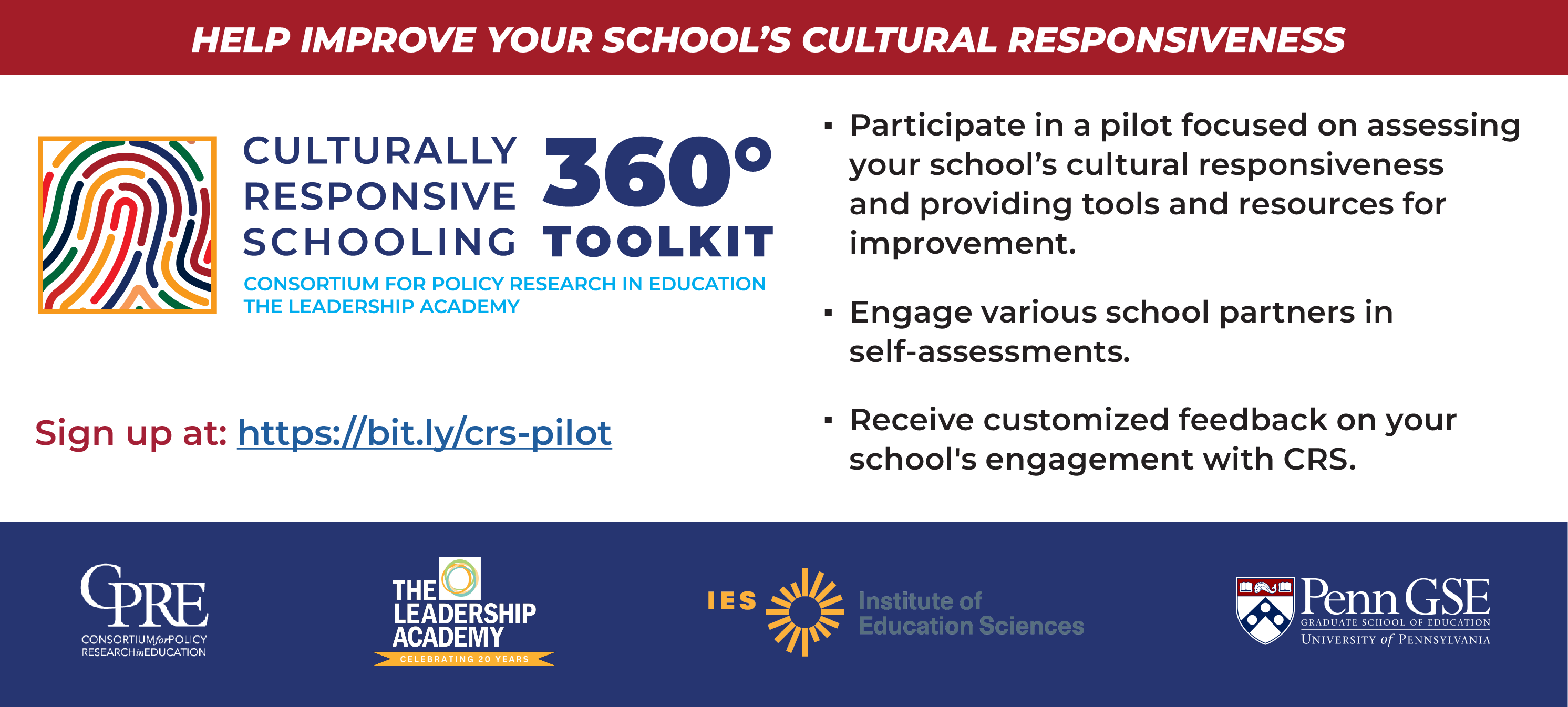Projects
Culturally Responsive Schooling
Increasing Educational Equity Through Culturally Responsive Schooling
September 2021—Present
Pilot a set of tools to assess your school's cultural responsiveness
The Consortium for Policy Research in Education at the University of Pennsylvania, in partnership with the The Leadership Academy, is seeking schools from across the nation with different levels of experience with culturally responsive work. Schools will participate in a pilot that uses a structured framework to assess different aspects and levels of culturally responsive schooling.
At the conclusion of the pilot, participating schools will receive feedback customized to their school, as well as resources to deepen their school's efforts to be culturally responsive to their students, families, and community.
To Request Participation, complete this interest form.
For more information contact: Carl-Anthony Watson at cawatson@upenn.edu
About the Project
Educators have been working for greater equity for decades, but with few enduring solutions. The stubborn statistics attest to the intransigency of the problem. Black and Latinx students are three times more likely today to attend highly segregated schools than they were less than 25 years ago. Segregated schools have lower test scores and higher drop-out rates. Students of color are less likely to be placed in AP courses, are over-represented in special education, and have higher rates of suspension and expulsion. Students of color are also less likely to graduate from high school and college.
In recent years, an emerging body of practice and research has pointed to a promising approach to identifying and addressing systemic inequities: equity-focused culturally responsive schools and culturally responsive leadership. Culturally responsive schools develop welcoming, engaging, and inclusive environments for students and families from diverse backgrounds. Positive learning environments are linked to higher teacher efficacy, decreased student absenteeism, increased graduation rates, and lower suspension rates of high school students. A culturally responsive leader builds the cultural capacity of teachers to teach diverse students effectively and promote pedagogy that validates and affirms student backgrounds. These behaviors have been shown to positively influence academic achievement and students' engagement with the school environment.
Schools will soon have a new set of research-based tools and resources to help them develop meaningful culturally responsive practices. The Consortium for Policy Research in Education (CPRE) at the University of Pennsylvania Graduate School of Education (Penn GSE) and The Leadership Academy, together with leaders from four universities, have received a grant from the U.S. Department of Education’s Institute of Education Sciences (IES) to create and validate research-based tools that school leaders can leverage to understand and cultivate culturally responsive practices.
Jonathan Supovitz (CPRE, University of Pennsylvania) will collaborate with a team of prominent scholars who are leaders in the field of culturally responsive education and leadership. Fellow team leaders are Sonya D. Horsford, Ph.D. of Teachers College, Columbia University; Hollie Mackey, Ph.D., of North Dakota State University; Rosa L. Rivera-McCutchen, Ph.D. of CUNY Lehman College; Constance A. Lindsay, Ph.D. of University of North Carolina at Chapel Hill; Marianna F. Fischer of The Leadership Academy; and Lisa Keller of University of Massachusetts Amherst. The Leadership Academy, a national nonprofit organization that supports and develops culturally responsive school and school system leaders, will provide expertise and facilitate collaboration with education leaders from a diverse set of schools and districts. The team will use The Leadership Academy’s research-based Culturally Responsive Leadership Frameworks as a starting point for developing a series of rubrics that capture the central domains of culturally responsive schooling.
PROJECT ACTIVITES
The research team of racially and geographically diverse scholars, including those at minority serving institutions (MSIs) and land grant universities, working in partnership with The Leadership Academy, a premier national leadership development non-profit, will collaborate with practitioners from a diverse set of schools and districts to produce a series of rubrics that capture three central domains of culturally responsive schooling and conduct a series of studies to examine their reliability and validity. The predictive validity studies will provide pioneering evidence about the relationship between cultural responsiveness and valued student outcomes. The measures developed during the course of this project will provide educators with a picture of both the dimensions of culturally responsive schooling and what different levels of engagement look like. Additionally, the team will contribute to the field's understanding of how educators across different contexts and education partners understand culturally responsive schooling, the requisite district conditions for meaningful culturally responsive school practices, and the role of the principal in brokering culturally responsive practices when there is resistance.
PRODUCTS
- The research team will produce a range of both practitioner and academic products.
- The main product is the CRS 360° Tool Kit website designed for districts and schools which includes the rubrics, a training guide and description of the requisite school and district resources and conditions for meaningful culturally responsive school practices. Academic products include a series of papers on such topics as the meaning and applications of cultural responsiveness, the process of collaborative tool development, the role of the principal in brokering culturally responsive practices, as well analyses of the reliability, predictive validity, and generalizability of the project instruments. Supporting outreach activities include webinars, conference presentations, panel discussions, and guest blogs.
Culturally Responsive Leadership Frameworks (The Leadership Academy)
The Consortium for Policy Research in Education (CPRE) at the University of Pennsylvania Graduate School of Education (Penn GSE) and The Leadership Academy, together with leaders from four universities, received a $3 million grant from the U.S. Department of Education’s Institute of Education Sciences (IES) to create and validate research-based tools that school leaders can leverage to understand and cultivate culturally responsive practices.



